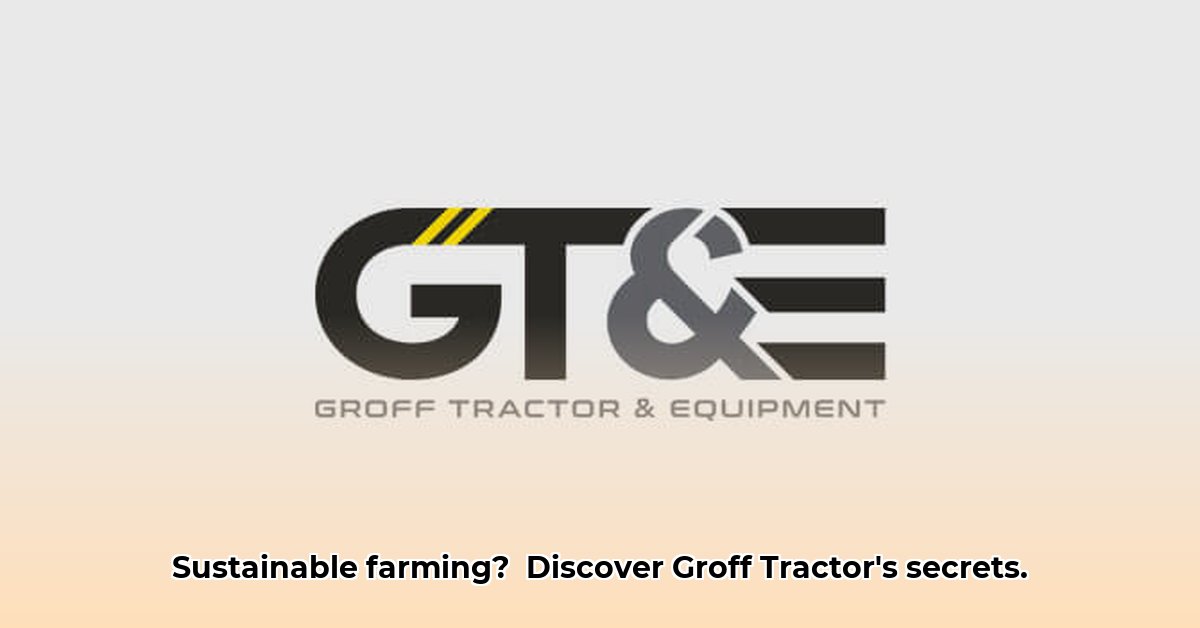
Pennsylvania agriculture is undergoing a transformation, striving for increased productivity while minimizing its environmental footprint. This article examines Groff Tractor Ephrata's role in this shift, focusing on how their equipment and partnerships contribute to sustainable farming practices in Pennsylvania. We analyze the potential benefits of their operations, highlighting areas where further investigation is crucial for a complete understanding of their impact. Learn more about Groff Tractor's operations at their website.
The Indirect Influence of Agricultural Machinery on Sustainability
Groff Tractor Ephrata, a John Deere dealership, doesn't directly engage in farming practices. Their contribution lies in providing the essential machinery that underpins modern agricultural operations. This includes equipment crucial for efficient farming infrastructure such as irrigation systems, farm roads, and building maintenance. However, the link between this equipment provision and sustainable agriculture requires careful analysis. While efficient machinery can theoretically lead to reduced resource consumption and minimized environmental impact, the actual on-the-ground effect depends heavily on the farmer’s implementation and management practices. It's not simply a matter of providing the tools; it's about how those tools are utilized.
Data Transparency and the Need for Further Research
A significant hurdle in assessing Groff Tractor’s contribution to sustainable agriculture is the lack of readily available, transparent data. Currently, information regarding their internal sustainability efforts, including emissions, material sourcing, and energy efficiency practices, is limited. This lack of transparency prevents a complete evaluation of their overall environmental impact. While their partnership with Trimble, a provider of precision agriculture technology, suggests potential benefits toward sustainable practices (specifically in optimizing irrigation and reducing soil erosion), the extent of this technology's real-world usage through Groff Tractor and its ultimate effectiveness remain unknown. This emphasizes the urgent need for systematic data collection.
Precision Technology: A Promising but Uneven Tool
The integration of precision agriculture technologies, like those offered by Trimble and utilized with John Deere equipment, holds significant potential for sustainable farming. Precision land grading, for instance, minimizes soil erosion and optimizes water usage. Efficient irrigation systems, often facilitated by Groff Tractor-supplied equipment, contribute to responsible water management. However, access to this advanced technology presents an equity concern. The high cost of such equipment might limit its adoption by smaller farms, thus creating a disparity in the benefits of sustainable farming practices. Further investigation is needed to understand the distribution of access to these technologies and the resulting impact on various farm sizes and operations within Pennsylvania.
Recommendations for a Comprehensive Evaluation
To accurately assess Groff Tractor's influence on sustainable agriculture in Pennsylvania, a multi-faceted approach is required:
Comprehensive Sustainability Audit: Groff Tractor should conduct and publicly release a detailed audit of their operations, measuring their greenhouse gas emissions, waste generation, and resource consumption to establish a baseline for future improvements and transparency.
Equipment Usage Tracking: Data on equipment sales, specifically focusing on machinery related to sustainable farming practices (e.g., fuel-efficient tractors, precision irrigation systems), is essential to quantify the scale of their contribution.
Real-World Impact Assessment: Independent research should be conducted to quantify the environmental impact of farming operations utilizing Groff Tractor's equipment. This would involve collaborations with farmers and researchers to measure changes in soil health, water usage, and fertilizer application.
Economic Viability Analysis: A cost-benefit analysis needs to assess the economic feasibility of adopting sustainable farming practices using Groff Tractor's equipment. This is critical for ensuring the long-term adoption of these methods.
Only through such comprehensive data collection and analysis can we accurately evaluate Groff Tractor’s complete role in shaping the future of sustainable agriculture in Pennsylvania. A collaborative effort involving Groff Tractor, researchers, policymakers, and the farming community is essential to achieve this goal. The journey towards truly sustainable farming requires transparent data, and the findings of such an investigation would offer valuable insights across the agricultural sector.